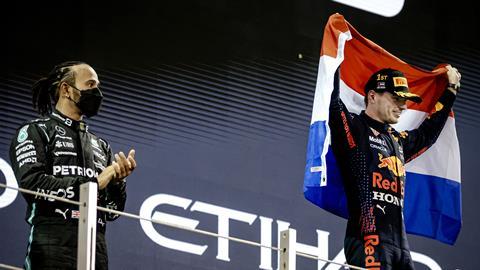On 12 December, the 2021 F1 World Championship finished in controversy in Abu Dhabi due to a safety car restart decision from the race director, which has been suggested not to be in accordance with the applicable rules, in the final minutes of the race. This article considers what happened in the context of the F1 dispute resolution process and the FIA’s regulations.
Background
On Lap 53 of 58, the safety car was deployed following a crash. Max Verstappen (of Red Bull) pit-stopped for fresh soft tyres; Lewis Hamilton (of Mercedes), who was on course for victory, did not. Eight 'lapped' cars were on the track, five of which were between Hamilton and Verstappen. The race director originally decided not to allow 'lapped' cars to overtake the safety car, but, after a communication from Red Bull’s team principal: (1) changed his mind, clearing those particular five 'lapped' cars out of Verstappen’s way on the penultimate lap (allowing him to get side-by-side with Hamilton behind the safety car); and (2) then removed the safety car on that same lap and restarted the race with one lap remaining.
As the BBC’s Andrew Benson put it, this left Hamilton 'a sitting duck on old tyres with Verstappen right behind him on fresh ones'. Verstappen won the race, and his first F1 Championship, over Mercedes’ strong complaints to the race director.
Rules
The 'safety car' procedure is governed by Article 48 of the 2021 FIA Formula One Sporting Regulations , which provides: 'If the clerk of the course considers it safe to do so, … any cars that have been lapped by the leader will be required to pass the cars on the lead lap and the safety car. … Unless the clerk of the course considers the presence of the safety car is still necessary, once the last lapped car has passed the leader the safety car will return to the pits at the end of the following lap'
Article 48.13 provides that the message 'Safety car in this lap…will be the signal to the competitors and drivers that [the safety car] will be entering the pit lane at the end of that lap'.
Further, Article 15.3 provides for the race director’s 'overriding authority' on matters including 'the use of the safety car'.
F1 Disputes Process
After the race, Mercedes lodged protests to the FIA’s stewards, alleging breaches of the regulations. The stewards have, pursuant to Article 11.9 of the FIA International Sporting Code, 'supreme authority for the enforcement of the code, [and] of the regulations of the FIA if appropriate' and 'may settle any matter which might arise during an event, subject to the right of appeal provided for in the code'.
In the words of one arbitration practitioner, Mercedes’ protests were 'resolved very quickly. … The FIA, marking its own homework, perhaps unsurprisingly said that it stood by the decision of the race director'. According to online reports of the stewards’ decision, the FIA acknowledged Article 48.12 may not have been applied fully, but was, in any event, overridden by Article 48.13, and the race director’s decision was appropriate. This emphasises the deference afforded to race directors’ decisions during a race (sometimes known in sports law as the 'field of play' doctrine).
Any appeal against stewards’ decisions would go to the FIA’s own International Court of Arbitration (ICA). Although the ICA is composed of judges elected by the FIA General Assembly, they are required to maintain their independence and impartiality.
How it works in practice
The features of the ICA procedure are set out in Article 10 of the FIA Judicial and Disciplinary Rules (JDR). Parties may be (and frequently are) legally represented. The president of the hearing must set a timetable for exchanging written pleadings and for the hearing. The timeframe envisaged under the JDR is short – 15 days for the appellant’s grounds of appeal; a further 15 days for the response (each of which may be abridged). Then, at least 15 days must elapse between the response and the hearing.
Hearings before the ICA are adversarial in nature, and may involve the presentation of oral submissions and hearing of witnesses and experts (if necessary), although witnesses and experts may only be examined 'upon special request in the event of exceptional circumstances, and at the discretion of the president of the hearing'.
Decisions of the ICA are taken by simple majority and must be reasoned. They are made public, save for confidential information. Generally, decisions are published (in English and French) less than one month from the hearing date.
Lessons for F1/other sports
The outcome of modern professional sport competitions impacts on the substantial financial interests involved in the sport – not least shareholders, sponsors and broadcasters – and on the spectators and the competitors themselves.
Notwithstanding that those refereeing professional sport are often required to take decisions that are (a) important, (b) watched by many, and (c) required quickly, the consistent and reliable adherence to the sport’s rules is of fundamental importance.
It is therefore fundamental that professional sports maintain dispute resolution mechanisms that allow for the expert, expeditious, independent and impartial determination of disputes, such as that which arose for F1 in Abu Dhabi.
At the time of writing Mercedes has just decided not to pursue an appeal. Nevertheless, the controversy generated by the race director’s decision is likely to place greater focus on the manner in which sports-related decisions are made and capable of being challenged.
Khawar Qureshi QC, Serle Court, London and McNair Qatar and Joseph Dyke, McNair, Qatar
































3 Readers' comments